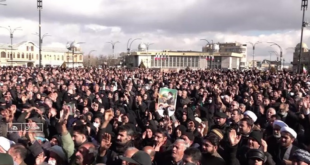 TEHRAN (FNA)- Russian Foreign Minister Sergei Lavrov expressed confidence on Tuesday that use of armed force in a bid to crush Iran’s nuclear capabilities would make the Middle East conflict impossible to settle
TEHRAN (FNA)- Russian Foreign Minister Sergei Lavrov expressed confidence on Tuesday that use of armed force in a bid to crush Iran’s nuclear capabilities would make the Middle East conflict impossible to settle
“I rule out any other possibility. If there is any use of force, there will be an unbearable pile of problems in the Middle East and any attempts at settlement will be torpedoed definitively,” Lavrov told Moscow radio station Ekho Moskvy.
“Direct talks between Washington and Tehran on the entire spectrum of problems are the key factor,” he said, “Talks are the only possible way to solve the Iran problem.”
Lavrov slammed the United States for “focusing on the Iraq problem alone” in its talks with Iran.
Elsewhere, Sergei Lavrov said that Russian concerns over Washington’s plan for a missile shield in Europe will only be eased if Russian officers have permanent access to the shield facilities.
Russia says the planned shield is a threat to its own security and the row over the issue has helped to drive diplomatic relations with the United States to their lowest point since the Cold War.
Moscow has, however, agreed to consider a set of confidence-building measures proposed by Washington to allay Moscow’s concerns.
“In all these many proposals we are interested only in two things: the permanent presence of our officers and reliable technological means of monitoring (activity at the sites),” Lavrov added.
The US has repeatedly accused Iran of pursuing military nuclear drives. A charge vehemently denied by Tehran. The US-led West has never presented any corroborative evidence to prove its allegations against the Islamic Republic.
The Security Council has, under heavy pressures by the US, imposed three rounds of limited sanctions since 2006 on Iran for refusing to give up its NPT right of uranium enrichment.
The Russian foreign minister also told Ekho Moskvy radio that “new positive proposals” should be put to Iran, without specifying what they might be.
The five permanent members of the UN Security Council and Germany plan to meet this month to discuss whether to sweeten their 2006 offer of incentives to persuade Iran to give up its right of uranium enrichment, US officials said this week.
Iran has ruled out halting or limiting its nuclear work in exchange for trade and other incentives, and says it will only negotiate with the UN nuclear watchdog.
The US is at loggerheads with Iran over Tehran’s independent and home-grown nuclear technology. Washington has laid much pressure on Iran to make it give up the most sensitive and advanced part of the technology, which is uranium enrichment, a process used for producing nuclear fuel for power plants.
Washington’s push for additional UN penalties contradicted the recent report by 16 US intelligence bodies that endorsed the civilian nature of Iran’s programs. Following the US National Intelligence Estimate (NIE) and similar reports by the IAEA head – one in November and the other one in February – which praised Iran’s truthfulness about key aspects of its past nuclear activities and announced settlement of outstanding issues with Tehran, any effort to impose further sanctions on Iran seemed to be completely irrational.
The February report by the UN nuclear watchdog, the International Atomic Energy Agency, praised Iran’s cooperation in clearing up all of the past questions over its nuclear program, vindicating Iran’s nuclear program and leaving no justification for any new UN sanctions.
Tehran says it never worked on atomic weapons and wants to enrich uranium merely for civilian purposes, including generation of electricity, a claim substantiated by the NIE and IAEA reports.
Iran has insisted it would continue enriching uranium because it needs to provide fuel to a 300-megawatt light-water reactor it is building in the southwestern town of Darkhoveyn as well as its first nuclear power plant in the southern port city of Bushehr.
Not only many Iranian officials, including President Mahmoud Ahmadinejad, but also many other world nations have called the UN Security Council pressure unjustified, especially in the wake of recent IAEA reports saying Iran had increased cooperation with the agency.
US President George W. Bush, who finished a tour of the Middle East in winter has called on his Arab allies to unite against Iran.
But hosting officials of the regional nations dismissed Bush’s allegations, describing Tehran as a good friend of their countries.
Bush’s attempt to rally international pressure against Iran has lost steam due to the growing international vigilance, specially following the latest IAEA and US intelligence reports.
 Eurasia Press & News
Eurasia Press & News



